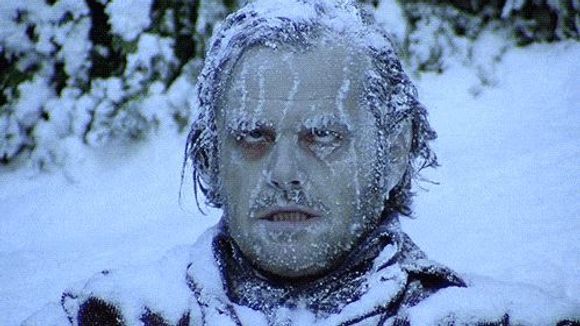In Ali Baba and the 40 Thieves, the number of thieves wasn’t really necessarily 40. The number was likely just chosen because 40 was an exaggerated number, much like when we’d say “I’ve told you a hundred million times”. So 40 as a shorthand for “a huge amount” seems fitting in celcius.
But really it is much better for human temperatures.
It’s just intuitive, 0F is 0% hot, and 100F is 100% hot.
When the dry bulb gets above 100F, wind only cools you down by sweat evaporation, and when the wet bulb gets above 100F, even that can’t cool you down, and you will die if you don’t get to a cooler or drier environment.
Lol, 0F is not 100% cold. That is barely cold unless you live in very warm place
Do you live in northern canada?
Europe
People do live outside of North America. I know that must be news to you, but it is the truth.
How is 0F 100% cold though, most places will never get that cold, so it surely makes more sense to have 0F at freezing point of water and 100F at 38C?
Freezing point of pure water - but saltwater/brine freezes as a different temperature.
pure water at mean atmosphere pressure at sea level if we’re getting technical, but frankly human body temperature varies from 35.5C (95.9F) to 37.5C (99.5F) anyway, and that’s before considering when people are ill, so if we go down that route it falls apart quickly enough that the definition of 100 given above is clearly just as arbitrary
Not to mention negative numbers.
“Intuitive” is a meaningless metric for a single scaled number. Whichever system you are used to will be the more “intuitive”.
Also, climate can play into which system feels more useful. Where I live, 100F occurs only rarely (and since air conditioning is almost ubiquitous, not something I’d bother looking out for), while 0C is an outdoor temperature that I do need to be aware of for half the year.
I disagree that either would be just as intuitive. Fahrenheit being 0=cold and 100=hot is intuitive because there are a lot of things we do in the world that exist on a scale of 0 - 100. Percentages, just off the bat. Also, fahrenheit has a higher degree of fidelity in the temperature range that we use.
Celsius’s general temperature scale is like -10 - 40 which is absolutely not intuitive because it doesn’t look like any other scale we use as humans. I agree that we get used to Celsius fast and it’s a fine it’s not like it’s super confusing (and Celsius is so much more useful scientifically).
“cold” and “hot” are completely non-descriptive and useless parameters for your supposed “intuitive” system.
Which system did you grow up with? Because I grew up from the start with Celsius und it is 100% intuitive to me. Everytime you americans use your funny temperature numbers I have to stop and use a tool for transforming it or I simply ignore it and go “low means cold and high means hot, how high? Ain’t nobody got time for dat!”
So I disagree with your notion that Fahrenheit is intuitive. The system you grew up with and have multiple experiences as reference points for, is the system you feel is intuitive is also my opinion.
Never said either one can’t be intuitive, just that the scale of farenheit has a precedence outside of it being an arbitrary temperature measurement by being a scale that goes from about 0 - 100.
If you had never used either scale and some one asked: “which is more intuitive, a temperature scale where -10 is really cold and 40 is really hot or one where 0 is really cold and 100 is really hot?” I know which one I would pick because I’ve done things before like calculate percentages and work in a base 10 system so it makes sense for the scale to be between two orders of magnitude.
But that is what we others are saying: there is no “more intuitive” system, just one you know better and can quicker evaluate how it would feel! So you agree with us.
Everything you said can be said about Celsius scale as well.
There is also a precedence for Celsius more than just an arbitrary number between 0 & 100.
A scale for liquid water, you know, the stuff that is the reason why we call our little spaceship "the blue marble"and why we even have this discussion, because it is the basis of all life on earth, is also not a bad choice for a number between 0-100.
And you made me curious: in what context did you have to calculate percentages of temperature that were not in Kelvin? Because as soon as percentages and temperatures are close to each other in one sentence the only example I can think of are things like reaction kinetic calculations and those are neither in Celsius nor in Fahrenheit.
You should examine your definition of intuitive. Yes, technically nothing is intuitive it’s just based on what you know because intuition is also based on what you’re used to.
By your logic, if you compare a machine that powers on by pressing a big glowing red button labeled “ON” and one that turns on by you performing the haka in front of a camera while reciting a Shakespeare sonnet backwards you might say that there is no “more intuitive” way to turn on a machine, just one you know better and can perform quicker!
You aren’t reading what you’re replying to because I said in a previous post that it’s easy to get used to Celsius and fahrenheit and there’s no difference to either and I also already said that Celsius is better for science because it’s based on water.
Everything you said can be said about Celsius scale as well.
At this point you’re just lying or further proving that you didn’t even read the post you tried to respond patronizingly to. I said that the Fahrenheit scale is intuitive because it’s a 0-100 scale which is similar to other scales we use all the time and works well for our base 10 counting system being a scale essentially between two powers of 10. Neither of that can be said for Celsius and that’s so obvious I think you just didn’t read it before replying.
And hell, on top of all this, I think we should all switch to using Celsius! Because as I mentioned it’s easy to grasp both scales and using Celsius makes understanding a lot of science easier which I think is the only real argument in this arbitrary choice between the two! But I’m out here explaining the use of Fahrenheit because people here can’t grasp my explanation for why people might use it and are acting like they’ve got the defeater to a post they didn’t even read!
But fahrenheit is not a 0-100 scale. You have just arbitrarily picked out 0-100 because that makes your brain more easily understand the non-intuitive system which is fahrenheit.
That’s not either scale being intuitive or unintuitive, that’s your familiarity with one over the other.
I got curious so I did some research on the definitions and why everything is this way. It looks like they originally picked the coldest thing they had (brine, possibly inspired by the coldest weather), the freezing point of water, human body temperature, and the boiling point of water. It was supposed to be brine at 0, water freezing at 30, the human body at 90, and water boiling at 240. Fahrenheit then recalibrated his scale slightly to make his math (and thermometer design and production) easier, and also because he noticed water actually boiled at 212 by his newly modified scale.
Looking at it like that work the context of what they had at the time and what they were trying to do, it makes a lot of sense.
What you grew up with =/= what is intuitive.
That is not what intuitive means. You’re talking about what’s “familiar”.
Familiarity is subjective. Intuitiveness is objective.
If we want to go that road, intuition is according to Wikipedia:
Intuition is the ability to acquire knowledge, without recourse to conscious reasoning or needing an explanation.[2][3] Different fields use the word “intuition” in very different ways, including but not limited to: direct access to unconscious knowledge; unconscious cognition; gut feelings; inner sensing; inner insight to unconscious pattern-recognition; and the ability to understand something instinctively, without any need for conscious reasoning.[4][5] Intuitive knowledge tends to be approximate.[6]
Since every temperature system needs an explanation, namely the reference points, no system is or even can be intuitive per this definition.
It has only been 100°F once in the last century. Nobody has any point of reference to make this intuitive. 30°C/85°F is defined as hot around here. 40°C/100°F is defined as national emergency.
“It has only been 100F once in the last century”
Lmao what?? Go ahead and find me a source for that.
I guarantee you it reaches 100F regularly during summer in many temperate climates, that’s not even including warmer regions.
Do you think your little small town is the only place in the universe?
it reaches 100F regularly during summer in many temperate climates,
Not when it’s near the sea, like most of western Europe. It’s the same shit as “why don’t you have airco?” Because it was never that hot.
Tell that to the gulf coast, or Mexico, or central America, or Africa, or Australia.
Your experiences are not universal. Just because you’ve never seen 100F doesn’t mean no one else has. That’s absurd.
The heat index gets over 100°F in much of the southern US every summer
Being 41% of the way to boiling water sounds pretty hot to me, too.
0F is 100% cold, and 100F is 100% hot.
So 50% is perfect temperature, no?
I love it when it’s -10% hot in winter nights or 110% hot around the equator. Makes perfect sense.
Yes, it does a better job of impressing that is all of the hot (or cold), and then 10% more than the difference between 38 and 43
Any of the systems is better if you have an intuitive understanding of it. I don’t know what 107 F would feel like, just as you don’t know what 42°C feels like. But it’s not a thing where one is inherently better than the other…
i assure you, we who grew up with celsius absolutely know the dire difference between 38 and 43. 38 is death, 43 is the crimson realms where even souls wither.
all this “which one is better for x” is nonsense, you develop a feel for whichever you grew up with. it’s just that the math is less stupid with metric. that’s all.
Yes, it does, actually, if you understand how thermal energy works.
Use Kelvin then, 314°K is a way bigger number
No °, just K
314 K

Temperature doesn’t care about your feelings.
Oh, how rude.

Humans are mostly water. If water boils, then humans will mostly boil too.
Strange, because it is bullshit.
Fahrenheit isn’t how people feel, otherwise 50° would be perfect temperature.
You Americans are just used to thinking in Fahrenheit, that is why you think it is how humans feel. As a European, I “feel” in Celsius.
As is typically responded to this ‘response’: there are a large number of people-many European-who would unironically say that 50°F (10°C) is, in fact, the ideal temperature.
They’re wrong, of course, but they exist.
But you’re also assuming that the exact middle of the range is where the ideal sweet spot should be. That’s wrong. People generally can better handle larger temperature deviations that are colder than their ideal than hotter deviations.
The difference is that humans emit their own heat. Combined with our funny tendency to wear insulative clothing that can asymptotically approach zero net heat exchange with the atmosphere, acceptable temperatures skew wildly towards and beyond freezing.
Meanwhile, without some kind of acting cooling mechanism, any temp even slightly above fever temp is inevitably fatal. You can only take off so many layers. What are you going to do, take off your skin? Sweating helps us humans a lot, but evaporative cooling can only do so much to reverse the heat gradient.
50 F is excellent… with a light jacket or a blanket. Not so much if you’re naked.
Why would you pick 50 for the perfect temp? Genuinely curious why land on that number.
Because 0° is the minimum a body is supposed to endure according to the tweet, and 100° is the maximum a body should endure.
So the ideal temperature should be right in the middle.
But it isn’t, so Fahrenheit isn’t “how people feel”.
Why should the ideal temperature be right in the middle of the range?
It’s no surprise that the maximum end of the range is right around the body temperature, as it’s difficult for the body to keep itself cool once the environment is around or warmer than the body temperature. Sure, we can sweat, but that uses up a lot of water and people generally find that getting all sweaty to not be pleasant. Run out of water or raise the temperature too much and it gets dangerous pretty quickly.
On the other hand, if the environment is a lot cooler than the body temperature, then it is difficult for the body to keep warm. I’m sure for our distant ancestors who lived in what is now Africa, their minimum temperature was much higher, possibly putting the ideal temperature right around the middle of their range. Luckily for us, we have clothing and can put on more clothing to stay warm, which is how we can now make the minimum so low. But while we can use clothing to lower our minimum, we really don’t have anything different to raise our maximum vs. our ancestors - we’re both limited by how well we can cool ourselves by sweating. So for that reason it doesn’t really surprise me that our ideal temperature is towards the upper end of what we consider the minimum and maximum temperatures.
Because it is in the middle of that “0 is really really cold, 100 is really really hot” “human feeling” fahrenheit scale you guys keep going on about.
50 degrees is a damn good temperature. I won’t stand here and let you besmirch 50 degrees.
Its not the “perfect” temperature but what temp in celcius is “perfect”? What a ridiculously proposition that there’s a perfect temperature.
20 is perfect.
otherwise 50° would be perfect temperature.
I love it when it’s 50ish out and sunny. You don’t get all sweaty, plus you can wear cozy socks and sweaters or just go out in short sleeves and both are perfectly fine. The bugs all start going into hiding at that temperature but the grass and leaves are still green
Rating inflation. If someone called you a 5 or 6 out of 10, you’d feel bad. 7/10 is the bottom of acceptability, just like 72° is room temperature.
Removed by mod
riddle me this then mr european man (i assume for the context of shitposting)
would you feel ok with getting half of everything you did being completely wrong, or would you feel ok with only three of those 10 things being completely wrong.
half is formidable, like you tried, probably. 7/10 is on the way to being good at it though.
Removed by mod
it’s a question surrounding human bias on the subject of correctness. Most people would argue that 7/10 is “ok or good” where as most people would argue that 5/10 is “not the worst, but not good”
we’re not fundamentally biased to the midpoint of something, we’re fundamentally biased to the perceived average of something.
You think that’s some copium, watch this:
When you’re a child having a sick-day, you get to stay home from school and watch TV, which is absolutely 💯. What temperature do you need to have to get a sick-day? 100°
In foreign units, 100° is the temperature at which water boils. What has boiling water ever done for anyone? Literally nothing. But in freedom units, water boils at 212°. 212 is a palindrome and palindromes are so cool, they could be classified as 💯. As we all know, 100 is the coolest number, which is why that’s how high grades go.
Finally, using USA standards, calculating calories in food merely requires measuring how much energy is required to raise 3.5 oz water 1.8° F by burning the food and then dividing by 1000. Using your weird unpatriotic methods, you’d have to measure how much energy is required to raise 100 grams of water 1° C by burning the food and then not dividing by anything??? Sounds lame!
Someone give me a Gatorade, those mental gymnastics were a hell of a workout
Even better, I don’t even feel a fever until it’s 104°F. I’ve just looked it up, and that’s exactly 40°C. Even my body likes round centigrade numbers.
50F is the perfect temperature.
The correct rebuttal is that 69 degrees is ideal ambient temperature.
That’s 10°C for those who want to judge you. And you’re wrong, the perfect temperature is 17°C. Not too cold, not too hot.
Fahrenheit literally meant to base the scale with 100 being human body temp.
It literally was not.
I cited and linked my source from the 18th century when it was redefined. What’s yours?
Horse* body temp
I like this version better than “he had a fever when he measured 100 degrees” so I will choose to believe it without further research.
I hope you are correct.
The Report of the Committee Appointed by the Royal Society to Consider of the Best Method of Adjusting the Fixed Points of Thermometers; And of the Precautions Necessary to Be Used in Making Experiments with Those Instruments
Seems fancy and legit, I see no reason to actually read it and confirm the info.
Welcome to peer review!
I’m pretty sure that wasn’t actually Fahrenheit’s intention, more a happy accident. Also if your body temp is 100°F then you’re running a mild/moderate fever.
The scale was adjusted later to make freezing and boiling points land on exact numbers with an easily-divisible 180-dregrees between them (180 is divisible by 2, 3, 4, 5, 6, 9, 12, 15, 18, 20, 36, 45, 60, and 90).
https://archive.org/details/paper-doi-10_1098_rstl_1777_0038
I don’t usually run, but when I do, I run a mild/moderate fever.
I heard circular thermometers were how it was done then so he lined up 180° with 180°.
Fahrenheit isn’t how people feel, otherwise 50° would be perfect temperature.
it is though? It’s like perfectly comfortable because you can dress up just enough to where you’re actually wearing a decent bit of clothing, but you can also dress down to a pretty light set of clothing as well.
This is also ignoring that this is both, arbitrary, and also completely subjective to the person.
The human body might end up liking 70f more than 50f, purely because it’s 96f inside the body, so something lower to allow heat transfer, but not low enough to be physically uncomfortable would be more expected.
Actually, here’s a good question, why do you land on the 50f point? Are you expecting the middle to be the most optimal point of perfection? Or is this just a metric brain thing?
As a European I can perfectly feel the 0 degree. I step outside and 5 seconds later I can tell you if it’s below zero or not.
For me “it’s now really hot” in summer is exactly when it’s over 30C. It being 86F doesn’t make any more sense. Approximately above 35C I will avoid going outside. Which would be 95F, not 100. From here, the temps in summer in the south of Europe are often around 100F at peak. Above or below doesn’t matter.
All that Fahrenheit scale is good for is if you live in a continental climate, more to the south, e.g. some useless place like Oklahoma, where 0F is approximately year low, and 100F is approximately year high.
For all other places, where the temperature delta over the course of the year is not as extreme, this Fahrenheit scale is as unintuitive as celcius, e.g. you just get used to it.
For me “it’s now really hot” in summer is exactly when it’s over 30C. It being 86F doesn’t make any more sense. Approximately above 35C I will avoid going outside. Which would be 95F, not 100. From here, the temps in summer in the south of Europe are often around 100F at peak. Above or below doesn’t matter.
you guys need to stop converting directly between temperatures, you’re right at 86f, bump it up to 90f and woah, suddenly it’s actually a nice round number.
You’re too conversion pilled to realize that the human experience isn’t fundamentally and objectively representative. 1 degree celsius isn’t super noticeable, just like 5 degrees fahrenheit isn’t super noticeable either.
What annoys me about that phrasing, is that “how water feels” is quite relevant to how humans feel.
The obvious example is that if it’s below 0°C, it starts freezing, which causes slippery sidewalks, snow, dry air, all that stuff.
But just in general having a feeling how much water will evaporate and later precipitate at certain temperatures, and even stuff like how hot beverages and cooking temperatures are, it’s all still relevant for humans…The obvious example is that if it’s below 0°C, it starts freezing, which causes slippery sidewalks, snow, dry air, all that stuff. But just in general having a feeling how much water will evaporate and later precipitate at certain temperatures, and even stuff like how hot beverages and cooking temperatures are, it’s all still relevant for humans…
that’s an interesting idea, BUT, the boiling point for water also exists under f as well, it’s just 212 f, which if you want to round for convenience, is 200f. 100f is just about half the boiling point of water.
I guess you celsius folks might be more water pilled than the average US citizen, but it’s not like it’s impossible.
100F is just about half
Your scale in water terms starts at 32. 100 is nowhere near halfway between 32 and 212
the celsius scale literally covers 55% of the range of the fahrenheit scale. I’d say “about half” is perfectly reasonable.
granted, it skews since you’re starting on the low end. The figure is more like 122f right in the middle, which is, not great, but i wasn’t going to calculate the half boiling point as i’ve literally never seen it be relevant anywhere lol.
Celcius degrees are quite a bit larger than Fahrenheit degrees. 0 to 100C is much larger than 0 to 100F so I don’t get what you mean by Celcius covering about half of Fahrenheit. In any case neither scale runs out of numbers high or low
my main point was that accuracy matters a lot less with fahrenheit, because it’s so much broader. a range of about 10 degrees fahrenheit is the average subjectively experienced “change” in temperature, at least on the higher end, where there’s more difference between the individual numbers. On the cold side there’s a lot less variance as it meets at about -40 in both systems.
In any case neither scale runs out of numbers high or low
this is very true though, hard to run out of numbers when you can just make more up, although there is an ultimate limit in either direction, due to what temperature actually measures. That’s a physics thing though.
The words you are looking for are that Fahrenheit is more precise. But it’s not as there are an infinity of numbers between any two integers.
My thermometer at work which I use for health and safety stuff reports temperature to two decimal places. Had we wanted more precision we could have gone with twenty decimal places. In too big or too small metric units we use multipliers - metres are too small for long distances so we use kilometres (thousands of metres), metres are too big for construction so we use millimetres (thousandths of metres)
Where Celcius degrees are too big, people (scientists, since whole degrees or a single decimal is enough for everyone else) use milikelvins
In Celcius water boils at exactly 100°C, and you don’t have to round, and 50°C is exactly half the boiling point of water.
Yes, Celsius users are waterpilled: the whole system is based on the temperature at which water freezes and evaporates at 1 atm pressure.
(You’re just fucking with us right? Like Celsius is has a coarser base unit, and the range applicable to human temperatures are not such pretty numbers, but you can’t be seriously thinking Fahrenheit makes more sense for when we talk about water?)
In Celcius water boils at exactly 100°C, and you don’t have to round, and 50°C is exactly half the boiling point of water.
unless you’re doing literal chemistry, the specific boiling point of the water doesn’t matter, especially for any subjective referential experiences you might have, such as, going outside.
(You’re just fucking with us right? Like Celsius is has a coarser base unit, and the range applicable to human temperatures are not such pretty numbers, but you can’t be seriously thinking Fahrenheit makes more sense for when we talk about water?)
i’m not saying it’s better, i’m just saying you’re having a failure of imagination to conceptualize the usage of the fahrenheit system if you so pleased to use it in such a specific manner, which almost nobody here does. You could still do it though.
Cooking is basically water based chemistry, so it makes a lot of sense to use Celsius.
Humans are mostly water. If water boils, then humans will mostly boil too.
Fahrenheit is literally a German dude making a scale from, “scheiße its chilly outside” to “oh mein gott, its hot out!”
Their friend is a dumbass though.
That’s why I only use Kelvin. 314.15 sounds like 3 times more “WTF HOW HOT IS TODAY??!?” than your paltry 107
0 Degrees Farenhight = very cold, 100 Defrees Farenhight = very hot
0 Degrees Celcius = very cold, 100 Degrees Celcius = dead
0 Degrees Kelvin = dead, 100 Degrees Kelvin = also dead…
What? 100°F is too mild. It doesn’t even boil water!
mild in what way? Do you live in death valley??? Have you ever experienced 100f? You can literally get heat exhaustion, and heat stroke from temperatures of 110f pretty easily if you aren’t watching yourself, we remind ourselves of this constantly anytime it gets hot.
They are referring to the fact that 100 celsius literally boils water.
good point, but to us Celsius fans or “Celsilovers” over one hundred sounds like the apocalypse.
I am being forced to learn celsius by my non American friends. Call me an incelsius.
Which is the closest thing to a legitimate criticism of celcius that exists. The entire top half of the scale (everything over ~50°, that is) is pretty much useless as far as judging the weather is concerned.
yes, that part is for cooking
Top half? 0-50°C is the top half. The bottom half is -50-0°C.
By that logic, Americans should use km/h instead of mph. Going 0-100 is much better than 0-60. For the same reason you keep telling us why Fahrenheit is so much more intuitive.
would someone explain to me why whenever european people are confronted with the idea of the imperial system their brain seems to shutdown into a slow state of oxygen preservation? I genuinely don’t understand it.
“40c in f is 104???” yeah, round it, its 100f, you think we specify to the Nth degree here?
“86f doesn’t really make sense” yeah, round it. 90 is pretty close, and who boy 90s are pretty hot.
“why isn’t 50f the perfect temperature” you’re literally just applying an arbitrary point on something entirely arbitrary. But ok. (also it is the perfect temperature range between 50-70f)
“how is -17c and 37c cold and hot???” literally round it bro, -20 and 40c are right there wow look at that now it makes more sense! Im pretty sure this commenter is aussie or something, so in their defense, anything under 70f is cold for them. Either that or they don’t wear clothes, ever, because they’re calculating the coldness with no clothing. for some reason.
“yeah but we also think of things in relation to the temperature of water, like freezing is when shit is icy, and also the relation to the boiling point” brother, water boils in fahrenheit as well (212f, but again, you’re going to shocked by this one, you can round it down to 200f, wow look at that, it’s like, pretty close.) sure the freezing point is still higher, but you really only get freezes here at super prolonged periods of just under 30f weather, or really cold snaps that stick around a bit. generally snow in 30f weather is, not really a thing, the ground is still warm enough it melts. ice doesn’t form unless it’s like, close to 0.
guys, i promise, it’s not this hard. Just, think about it a little bit, please. You’re killing me here!
I hate that I agree with this lol
For proof that this thread is just people justifying what they know as better somehow, look no further than Canada.
We do cooking temps in Fahrenheit, weather in Celsius. Human weights in pounds, but never pounds and oz. Food weights in grams, cooking weights in pounds and oz. Liquid volume in millilitres and litres, but cooking in cups, teaspoons and tablespoons. Speed & distance in kilometres, heights in feet and inches.
Try and give this any consistency and people will look at you like you’re fucked. The next town is 100km over, I’m 5ft 10in, a can of soda is 355ml, it’s 21c out and I have the oven roasting something at 400f. Tell me it’s 68f out and I will fight you.
People like what they are used to, and will bend over backwards to justify it. This becomes blatantly obvious when you use a random mix of units like we do, because you realize that all that matters is mental scale.
If Fahrenheit is “how people feel” then why are feet useful measurements of height when 90% of people are between 4ft and 6ft? They aren’t. You just know the scale in your head, so when someone says they’re 7ft tall you say “dang that’s tall”. That’s it.
As a Canadian idk why your using us an an example, we are wrong to do so and we blame Americans for giving us this bad habit.
then why are feet useful measurements of height when 90% of people are between 4ft and 6ft? They aren’t. You just know the scale in your head, so when someone says they’re 7ft tall you say “dang that’s tall”. That’s it.
to be clear, we use feet and inches, and there is historical precedent for breaking things down once they get past a certain grouping, we only have 10 fingers after all. To me the difference between 200cm and 220 is literally fuck all. You ask me the difference between 4 ft and 6ft and i can pretty quickly tell you.
I find it weird that when measuring height in metric, people using cm exclusively, i’ve noticed this a lot actually, people will use cm or mm in places where it arguably doesn’t make any sense. I could see the justification for doing math maybe, but like, that defeats the whole point of it being metric no?
Shouldn’t you be using meters and cm for height specifically? Since most people are a good bit over one meter i feel like it would make sense to do it that way. But then again that’s just kind of a shit bucket worth of options you have, ideally you would use decimeters, but nobody uses those things for some reason.
We do cooking temps in Fahrenheit, weather in Celsius.
Fahrenheit: let’s use “really cold weather” as zero and really hot weather as 100.
Celsius: let’s use “freezing water” as zero, and “boiling water” as 100
Canucks:

If Fahrenheit is “how people feel” then why are feet useful measurements of height when 90% of people are between 4ft and 6ft?
Those are two different things. Hope this helps.
Imagine weighing people as big rocks, though.
Until the UK changes that, us Americans and Canadians can rest assured that nothing we are doing is quite that ridiculous.
Outdoor temperature in °C, unless you’re talking about an outdoor pool then it’s often enough °F :-)
I think part of the reasons it’s so mixed might just be due to how many Amero-centric devices and parts are common between the two countries.
Y’all can take your shitty Phillips screws though. Roberts is by far superior ;-)
it’s not about what makes more sense: what makes more sense is what you use everyday and is natural to you. 40+ C is freaking hot because when you experience it, it’s freaking hot. It’s about what the entire rest of the world is using as a standard.
41°C sounds terrifying to me
The real reason Fahrenheit will never die!
https://youtu.be/nROK4cjQVXM
(Finnemore’s conversation between Farenheit and Celsius)


















